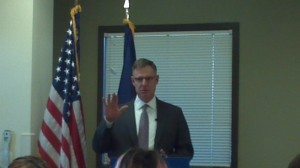Logan Heights branch of Family Health Centers of San Diego adds twist to Congressman’s ACA outreach efforts.
By Andy Cohen
Congressman Scott Peters may have his issues with the Affordable Care Act—and let’s be honest, who doesn’t?—but you’d be hard pressed to find another elected member of Congress who has done more, conducted more outreach efforts to inform his or her constituents about what the law really is, how it works, and how they can best take advantage of what it has to offer. It’s an imperfect solution to an even more imperfect healthcare system, but it’s a start, and a reasonably good one particularly given the current political environment and adamant GOP opposition to a law they have exactly zero chance at undoing.
The ACA, or “Obamacare” as it’s come to be known, is a work in progress, says Peters. It can be a success, and it will be, but we have to work to make it better.
His Republican colleagues, says Peters, would seem to prefer a return to the old way of doing things with regard to health care in America, and that’s simply not an option. The old way wasn’t working…..for anyone. And yet they have done everything in their power to undermine and sabotage the first significant expansion of healthcare in America since Teddy Roosevelt first tried over a century ago. “They’ve talked a lot about alternatives, but they haven’t offered a single one,” said Peters. Thankfully, he says, now that the law has been fully implemented, the days of constant repeal votes in the House of Representatives appear to be at an end. At least that‘s the hope.
In the meantime, the outreach efforts continue. In all, Peters’ office has conducted 13 ACA seminars throughout San Diego, including two that were geared toward the small business community, cutting through the circus of misinformation to get at the facts of what the health care law means for them (which, in most cases for small businesses, is not a whole lot).
The most recent event on Monday at the Family Heath Centers of San Diego clinic in Logan Heights came with a little extra added bonus: For the first time, those attending the seminar would be offered the opportunity to sign up for health insurance on the spot.

Congressman Scott Peters
“When (Congressman Peters’ office) approached us about doing a seminar, we decided that we wanted to do more with it,” said Ben Avey, the spokesman for Family Health Centers of San Diego. “It’s what we do, so it only made sense.”
FHCSD is a non-profit system of full service health clinics that focuses primarily on delivering health services to low income and uninsured patients, although they will accept any patient at all. With over 20 locations throughout the area, they are the largest health care provider in San Diego to focus on lower income neighborhoods. Since the passage of the ACA in 2010, said Avey, Family Health Centers has been at the forefront in preparing for the law’s implementation. “We took a ‘let’s make it work’ attitude from the very beginning,” he said.
“The cost of doing nothing was too great,” he added.
They began by developing their own in house electronic medical records system in an effort to follow the spirit of the ACA to cut down costs, provide easier access to patient information, and avoid the costly duplication of procedures. Combined with the efforts of the San Diego Beaconproject, and with the explicit consent of the patient, FHC medical records will be accessible to doctors and hospitals throughout the San Diego region, cutting costs and improving patient care.
The primary focus lately, however, has been on helping those without insurance find coverage, whether it be through Covered California, the state’s healthcare exchange, or identifying whether or not an individual is eligible for Medi-Cal under the law’s Medicaid expansion (Medi-Cal is Medicaid in California).
“We are a grassroots organization,” said Avey. As such, their own outreach efforts have included placing boots on the ground within the communities they serve to spread the word about the expansion of health care, and to encourage people to enroll in the healthcare exchange.
FHC has also partnered with group homes, community groups, and other grassroots organizations to spread the word about healthcare expansion.
But when Congressman Peters’ office approached FHC about conducting a seminar, it presented a unique opportunity: FHC employs their own enrollment counselors, enabling them to offer immediate on-site enrollment, something no other group has been able to do.
With the assistance of 2-1-1 San Diego, attendees were given a brief, yet detailed presentation, in English and Spanish, of what exactly the Affordable Care Act does, and what it means to them. They were given details of the different plan options available, information on who is eligible for Medi-Cal, and how the health care subsidies work for those who do not qualify for Medi-Cal. They were instructed on what the different plan options that are available through Covered California mean (Bronze, Silver, Gold, and Platinum), and what each plan available through the exchange is required to cover.
At the end of the seminar, those who were ready to enroll were directed toward the back of the room where enrollment counselors were ready to get the process started.
“Twelve percent of Latino children in California are uninsured,” said Congressman Peters in his introductory remarks, “compared to only five percent of non-Latino white children. And of all the uninsured children in California, 70% are Latino.”
Nationwide, “10.2 million uninsured Latinos are now eligible for healthcare coverage that weren’t before the law existed,” with 76% of them eligible for Medicaid he said.
With continued combined outreach efforts on the part of the Congressman’s office, Family Health Centers of San Diego, and 2-1-1 San Diego, it is the hope that those numbers will dwindle, and that more people will have access to health care not only when they need it most, but before they find themselves in desperate straits.